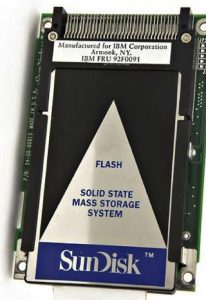History (1991): SSD Module
Flash non-volatile memory developed for mass storage systems
This is a Press Release edited by StorageNewsletter.com on May 21, 2018 at 2:24 pmThis article comes from the Computer History Museum.
1991: Solid State Drive module demonstrated
Flash non-volatile memory developed for mass storage systems
SanDisk (formerly SunDisk) prototype SSD module for IBM (1991)

(SanDisk Corporation)
By eliminating moving parts, the solid state drive (SSD) delivers the reliability, low-power, and performance advantages of semiconductor technology with the familiar architecture of HDD.
Early commercial SSDs appeared in the 1970s where high speed or rugged operation was paramount. Using volatile RAM chips backed up by batteries and HDDs to retain data when power was removed, StorageTek, Louisville, CO introduced the STC 4305 enterprise SSD that stored 45MB for $400,000 in 1978.
Named for its rapid erasure compared to earlier devices, flash EEPROM has emerged as the dominant SSD technology. Invented by Fujio Matsuoka of Toshiba in 1980, when the cell is configured as a NOR gate flash allows random access to any memory location and serves as a direct replacement for EE and EPROM chips. The NAND flash cell, also invented by Masuoka, is less flexible but with a smaller chip size and better endurance it is more suitable for mass storage applications.
Eli Harari, who pioneered thin-oxide processing at Hughes Aircraft in the 1970s, co-founded SunDisk (now SanDisk) in 1988 to develop the technology for digital cameras. In 1991 the company built a prototype SSD module for IBM that coupled a flash storage array with an intelligent controller to automatically detect and correct defective cells and demonstrate the practical application of the technology to mass storage.
Numerous companies entered the market for flash chips and specialized storage systems in portable packages such as the thumb drive. As netbooks and ultrabooks became popular SSDs standardized around the 2.5-inch notebook form factor.
In 2006 Samsung introduced the first high volume Windows XP notebook using SSDs.
Today SSDs comprise the fastest growing segment of the storage market.













 Subscribe to our free daily newsletter
Subscribe to our free daily newsletter

